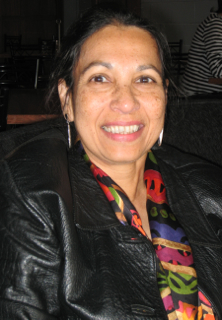Anne de Bruin
 Anne de Bruin
Anne de Bruin
Anne de Bruin was quite the trailblazer while studying at UNE from 1976-77, as you will read. On graduation with a Master of Economics in 1978 she received our D. H. Drummond Thesis Prize in Economic Studies for her Masters dissertation. Anne retired from academic life last year, after 44 years, but is an Adjunct Professor with the University of Auckland and Emerita Professor at Massey University, and remains committed to socio-economic reform.
What do you recall of your time at UNE and living at Mary White College?
I recall the lecturers in the Department of Economics most. There were no females, but it was quite a joke that we had several ‘male birds’ – by the names of Drake, Peacock and Nightingale. Professor Peter Drake was one of the great inspirations for my academic career. Another lecturer, Mendel Weisser, had reportedly been an internee during WWII, and his lectures were loaded with mathematics. It was a highlight for me to get an A+ from him for an essay on the theory of the second best and, to this day, this theory helps me rationalise life’s twists and turns.
In 1976, Mary White College opened its doors to couples and I believe my husband and I were the first. It was a privilege to be in residence. We enjoyed fully catered meals and formal dinners, and meeting other interesting women who weren’t studying economics. It was there that my love of wine began, after being introduced by a trio of Australian friends – one of Italian descent (whose parents had a vineyard), and the other two whose parents were Hungarian refugees.
How do you think UNE helped prepared you for your career?
My UNE experience gave me an excellent grounding for an academic career and valuable extramural teaching experience. I came to UNE because I was offered both a position as a Teaching Fellow in the department and a placement in the new Masters in Economics program in Development Economics and International Development. I taught a course in Development Economics throughout my career at Massey University. Like UNE, Massey had an agricultural college heritage, and was the only university in New Zealand engaged in distance teaching when I joined as a lecturer in 1977.
Tell us about the work of a socio-economist.
Socio-economists look at economic behaviour and challenges through an interdisciplinary lens. I bring concepts and ideas from different disciplines like sociology, economic sociology and politics into my research. For instance, drawing on sociology, I argue that even if people lack human capital in terms of formal education, they may be rich in cultural capital. Tapping into that cultural capital is a good way to create employment, especially in labour market disadvantaged communities. Feminist economics and institutional economics also play an important role in my theorising.
You were the founding director of Massey University’s New Zealand Social Innovation and Entrepreneurship Research Centre (SIERC) in 2010. What have been its major outcomes?
It was the first interdisciplinary centre of its kind in the country. Back then, the world was struggling to recover from the effects of the 2008/09 Global Financial Crisis and US President Barack Obama had set up the Office of Social Innovation and Civic Participation to recognise innovative community solutions and partnership models for social change. I saw the need to contribute to social innovation and entrepreneurship through collaborative research that connected all stakeholders, including practitioners, policy-makers and philanthropists.
SIERC has contributed to growing research in this area and the conferences I convened and organised made a valuable contribution. But after I retired from Massey there was insufficient support to continue its work and the SIERC sadly died of natural causes. Still, the social innovation and entrepreneurship dialogue that I wished to ignite through SIERC is very much alive and well, and I remain committed to research in the area.
In focusing on social enterprises and women’s entrepreneurship and innovation, how does your research contribute to job creation in disadvantaged communities and regions?
All my research has implications for practice and policy. So, starting from my early research, an implication was that communities can mobilise the cultural capital of people to create employment. My women’s entrepreneurship research creates more gender awareness and this helps to understand the challenges women entrepreneurs face, how to address them, and help grow their businesses.
What role can women play in “challenging and reshaping capitalism and producing progressive social change”?
Women, throughout the ages, have inspired and catalysed social change. I, myself, was inspired to commence my PhD journey when New Zealand, the first country to give women the vote, celebrated the centenary of women’s suffrage in September 1993. Today, it is not only women, but all genders that must work together to create progressive social change and a fairer society.
Why is multidisciplinary research important today?
It is more important than ever, given the complexity of economic and socio-economic problems in this post-COVID-19 era and the challenges of inequality and climate change. It is vital to helping find solutions to mitigate these problems.
What do you enjoy most about your work today?
I love bringing interdisciplinary insights to my research, working collaboratively with others and mentoring. As Emerita Professor at Massey University, I continue to research with and mentor colleagues and supervise PhD students. Earlier this year, I was delighted to be offered an Adjunct Professor research position in the University of Auckland Business School and the new Aotearoa Centre for Enterprising Women. This gives me the opportunity to further my gender and entrepreneurship research and to actively contribute to advancing the centre and women’s enterprise.

